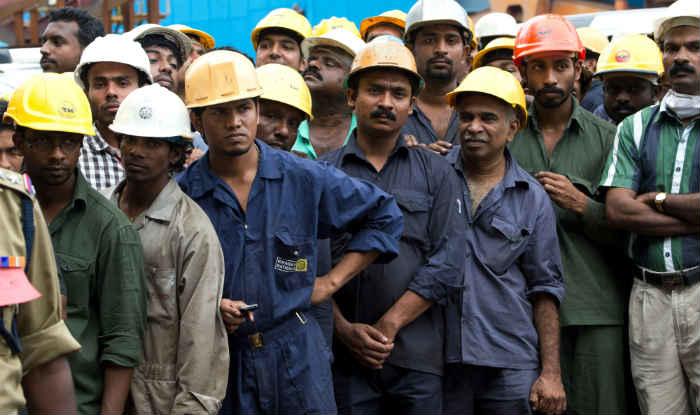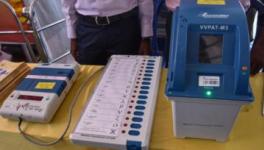Draft Code On Social Security Will Only Make Workers More Insecure

Image Courtesy: India
For decades, Indian trade unions have been demanding universal social security for all workers — both in the organised and the unorganised sector, the latter being where the overwhelming majority of workers earn their living.
But the Draft Labour Code on Social Security & Welfare 2017 prepared by the BJP-led NDA government — which claims to be “universal” by including the unorganised sector workers — seeks to destroy the existing, legally mandated benefits for workers without offering concrete replacements.
Ever since the labour ministry put up the draft Bill for public comments last April, all central trade unions — barring the RSS-backed Bharatiya Mazdoor Sangh (BMS) — have been opposing the it.
The draft Bill merges the 15 existing social security legislations into a single ‘Code’ on the pretext of “simplifying” and “consolidating” the laws. But it does not actually specify the social security benefits that will replace those provided by these legislations and leaves unanswered basic questions.
On 24 April 2018, the central trade unions along with the unorganised workers’ joint forum held a massive protest at Chennai, Tamil Nadu, against the draft code on social security.
All central trade unions — except the BMS again — were part of the protest demonstration in front of the central labour office at Shastri Bhavan on Haddows Road in Nungambakkam. More than 1,000 workers participated in the protest.
The trade unions which took part included the Centre of Indian Trade Unions (CITU), the All India Central Council of Trade Unions (AICCTU), the All India Trade Union Congress (AITUC), the Labour Progressive Federation (LPF), the All India United Trade Union Centre (AIUTUC), the Hind Mazdoor Sabha (HMS), and the Indian National Trade Union Congress (INTUC).
So why are trade unions opposing the Code? What are the main problems with it?
The 15 legislations that the Code will merge are —
• Employees State Insurance Act
• Employees Provident Fund and Miscellaneous Provisions Act
• Employees Compensation Act
• Maternity Benefits Act
• Payment of Gratuity Act
• Unorganised Workers Social Security Act
• Building and Other Construction Workers Welfare Cess Act
• Beedi Workers Welfare Cess Act
• Beedi Workers Welfare Fund Act
• Iron Ore Mines, Manganese Ore Mines and Chrome Ore Mines Labour Welfare Cess Act
• Iron Ore Mines, Manganese Ore Mines and Chrome Ore Mines Welfare Fund Act
• Mica Mines Labour Welfare Cess Act, the
• Limestone and Dolomite Mines Labour Welfare Fund Act
• Cine Workers Welfare Cess Act and
• Cine Workers Welfare Fund Act,
To begin with, this will lead to the dissolution of critical and well-functioning statutory schemes and mechanisms — such as Employees’ State Insurance (ESI), Employees’ Provident Fund (EPF), and Coal Mines Provident Fund (CMPF) schemes as well as the various Welfare Boards and welfare funds for employees in the informal economy in different states.
Among the most worrying aspects is that the Code does not specify whether all the benefits under these 15 legislations will still be available under the Code.
As Tapan Sen, general secretary of CITU, questions in a publication titled ‘Code on Social Security: An Exercise of Deception & Fraud’:
“Will all the workers get any payment called provident fund after they superannuate as in EPF Scheme? Will they get pension as per EPS 1995? Will they get medical care for themselves and their family members as in the ESI Scheme? Will they get assistance for their children’s education as per the Construction Workers Welfare Scheme? Will they get any assistance for construction of houses as in the existing Acts for the Beedi and Mines workers?”
The EPF and ESI schemes are especially crucial.
“The EPF scheme besides setting the mechanism to collect contributions from both employers and workers, provides for facility of temporary withdrawal, permanent withdrawal, final payment on superannuation, and monthly pension. CMPF (Coal Mines Provident Fund) is giving even better benefits than EPF,” writes Sen.
“ESI scheme provides for primary, secondary and tertiary health care including super-speciality treatment through its hospitals and dispensary network throughout the country, besides tie-up arrangement with other hospitals. ESI also provides seven types of cash benefits to the registered workers... The Code on Social Security is totally silent whether same benefits under EPF, ESI and CMPF will continue even after their amalgamation.”
Instead, the Code seeks to set up centralised bodies for the implementation of social security — the National Social Security Council, to be headed by the Prime Minister of India, as well as a Central Board of Social Security. There will also be State Boards of Social Security in each state.
As far as representation in the National Council is concerned, the Code allows only two representatives from the employees’ organisations, that too nominated by the central government. At present, six central trade unions are allowed to represent workers in the Central Board of Trustees of the EPF Organisation or the governing body of ESI Corporation.
Besides, the Code stipulates that one of the two representatives must be representing the unorganised sector workers. This will effectively leave place for only one trade union representative, given that trade unions represent both organised and unorganised sector workers.
“This is the window of accommodating Sangh sponsored NGOs. Now, all the recognised Central Trade Unions in the country represent workers in both the organised sector and unorganised sectors.Workers from the unorganised sector comprise the overwhelming majority of membership of all the recognised central trade unions,” writes Sen.
Also, the Code says the State Boards will deliver the benefits to the workers.
However, all the funds will be at the disposal of the National Social Security Council.
In fact, all the money with the existing central funds like the EPF, ESI, CMPF, Building and Other Construction Workers’ Welfare Fund, etc — and all the money with the existing Welfare Boards in all the states — will be transferred to the central pool.
“In Tamil Nadu, this Code will lead to the dissolution of 34 Welfare Boards for different kinds of workers, and all the money will go to the central government. States will have no money to spend on social security, but they are only supposed to deliver the benefits,” said KC Gopikumar, Tamil Nadu state secretary of CITU, speaking to Newsclick.
“We demand that the government instead strengthen the implementation mechanism of the existing boards and schemes, and double the current benefits,” said Gopikumar.
As things stand already, state-level agencies administering various welfare schemes have not been very successful.
Take the Building and Construction Workers’ Cess Fund, for example. As of 31 March 2017, a total of Rs 32,480 crores was collected under the fund and is lying with the state governments. Since the scheme began operating in 1996, only Rs 7,286.52 crore has been spent, according to CITU.
“Can anybody imagine, how a EPF subscriber will get his or her benefit of either temporary withdrawal or final settlement followed by pension under EPS 1995 on a defined benefit basis, from the boards run by the state government… How long will the state take to set up appropriate infrastructure with requisite number of trained manpower and widespread delivery network to ensure multi-dimensional benefits being given by EPF, ESI and CMPF?” writes Sen.
There are also a number of other problematic stipulations in the Code.
Apart from the central and state bodies, “licensed intermediary agencies would be involved in the processes of registration of workers, receipt of contributions, management of funds and payment of benefits,” says CITU. This is likely to open the doors for privatisation of the boards.
Another major issue is that the Code says only those establishments which meet the threshold level of employment decided by the government would be able to register under the Social Security Code to avail the schemes.
And the government has raised the threshold employment level under the Factories Act to 40.
“This means that more than 72% of the factory workers will be outside the coverage under the Act,” says the CITU publication. “As per the proposed Small Factories Bill, no social security legislation will apply for factories employing less than the threshold level of 40 workers.”
Then there is the requirement that workers from the unorganised sector are supposed to contribute 12.5% of their wages for the social security benefits — which is the same rate of contribution as that of the organised sector workers.
This is cruel, given that the “overwhelming majority of them do not get regular employment, nor the statutory minimum wages,” CITU points out.
The unorganised sector workers contribute more than 60% of India’s GDP, but they do not get any social security benefits. Although certain sections of unorganised sector — like beedi workers, construction workers, mine workers, cine workers, etc. — are entitled to some social security benefits, “not even 30% of these workers are covered in practice because of the total absence of effective enforcement machinery for these schemes, either at the central level or in the states,” according to CITU.
The UPA government had enacted the Unorganised Workers’ Social Security Act 2008, but no new social security benefits were given to workers nor were funds allotted for the social security schemes under that legislation. “Only some already existing social security schemes, most of them meant for BPL people were made applicable to the unorganised workers,” as CITU says.
And now that the BJP government is bringing fixed-term employment, which will allow all firms to hire workers on short-term contract basis and fire them without notice, the situation is only going to get worse as workers’ conditions become more precarious. In such a scenario, a sketchy social security code as the BJP has envisioned will only add to the misery of workers in the country, while promoting ‘ease of doing business’ for the corporates.
Get the latest reports & analysis with people's perspective on Protests, movements & deep analytical videos, discussions of the current affairs in your Telegram app. Subscribe to NewsClick's Telegram channel & get Real-Time updates on stories, as they get published on our website.
























